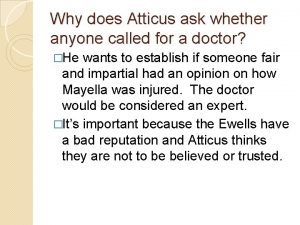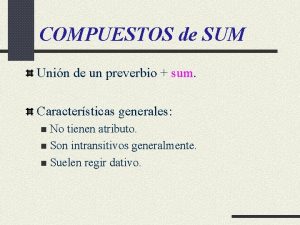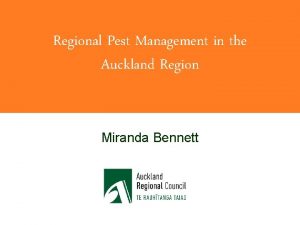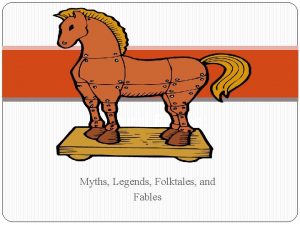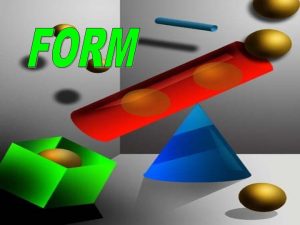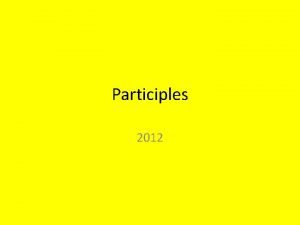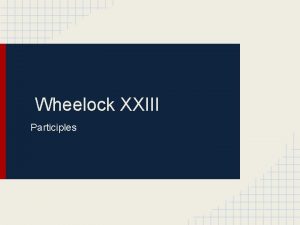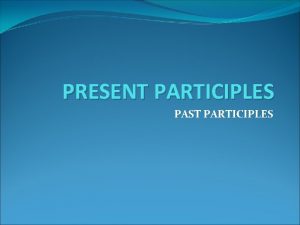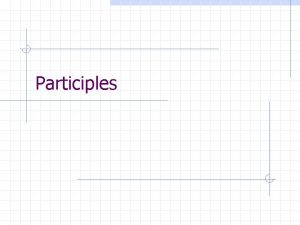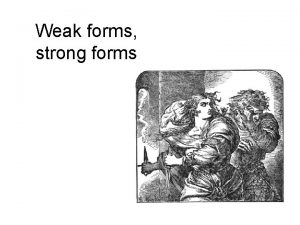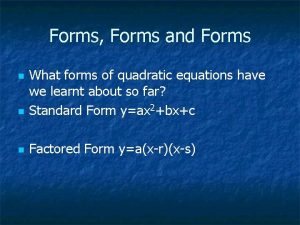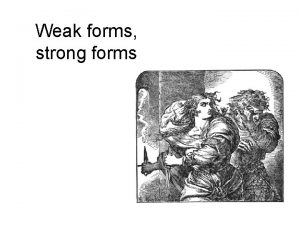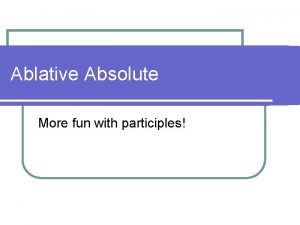Lesson 42 Possum Forms of Possum Participles as














- Slides: 14

Lesson 42 “Possum” Forms of “Possum” Participles as Nouns

Your Turn! • We’ll take 5 -10 minutes to do Workbook page 153, Ex. A and B (1 -10) • The answer to exercise A is “substantive. ” • Now…try Ex. B!

possum, posse, potui, ---- : can, be able • • Possum is a form of “sum. ” Possum’s BFF is an infinitive. I can swim = I am able to swim. She can dance = she is able to dance.

1 st person 2 nd person 3 rd person Singular Plural possumus I can, am able We can, are able potestis You can, are able Y’all can, are able potest possunt He/she/it can, is able They can, are able Present Tense Chart for “possum”

1 st person 2 nd person 3 rd person Singular Plural poteramus I could, was able We could, were able poteras poteratis You could, were able Y’all could, were able poterat poterant He/she/it could, was able They could, were able Imperfect Tense Chart for “possum”

1 st person 2 nd person 3 rd person Singular Plural potero poterimus I shall be able We will be able poteris poteritis You will be able Y’all will be able poterit poterunt He/she/it will be able They will be able Future Tense Chart for “possum”

1 st person 2 nd person 3 rd person Singular Plural potuimus I was able, have been able We were able, have been able potuistis You were able, have been able Y’all were able, have been able potuit potuerunt He/she/it was able, They were able, has been able have been able Perfect Tense Chart for “possum, posse, POTUI, ---” The pluperfect and future perfect tenses use the same stem, POTU-. They use the regular pluperfect endings (-eram, -eras, etc. , HAD BEEN ABLE…) and regular future perfect tendings (-ero, -eris, etc. , WILL HAVE BEEN ABLE)

Your Turn! Time to practice possum! Workbook page 154, Exercise D. A full list of the forms of “possum” are found on page 510 of your textbook. We’ll take 5 -10 minutes for this practice.

Time To Practice! • • Ambulare possum. I am able to walk. /I can walk. Potesne legere? Are you able to read? /Can you read? Puella dicere potest. The girl is able to speak. /The girl can speak. Pugnare possumus. We are able to fight. /We can fight.

More Practice---Different Tenses! Agricola carrum trahere non poterit. The farmer will not be able to drag the cart. Populus ducem videre non potuerat. The populace had not been able to see the general. • Cibum portare potuerimus. • We shall have been able to carry the food. • •

A Little More Practice! • • • Magister discipulos docere poterat. The teacher was able to teach the students. The teacher could teach the students. Femina liberos monere non poterit! The woman will not be able to warn the children!

Participles Used as Adjectives and Nouns • You’ve already met participles! • The 4 th principal part of a verb is the PERFECT PASSIVE PARTICIPLE. • The participle is an ADJECTIVE form of the verb! • paro, parare, paravi, paratus: to prepare • PARATUS: “prepared” or “having been prepared”

Participles Used as Adjectives and Nouns • • • nosco, noscere, novi, notus: to learn NOTUS: known (having been learned) porto, portare, portavi, portatus: to carry PORTATUS: carried, having been carried facio, facere, feci, factus: to do FACTUS: having been done

Participles Used as Adjectives and Nouns • Remember that adjectives can be used as nouns: bonus---the good man, bona---the good woman, bonum---the good thing • Participles are adjectives, and adjectives can be used as nouns, therefore, participles can be used as nouns! (A=B and B=C, ergo A=C) • notus: the known man (aka, an acquaintance) • factum: the done thing (aka, “deed”---one of your vocab words this lesson!)
 Whats appositive
Whats appositive Why does atticus unbutton his vest
Why does atticus unbutton his vest Preverbio
Preverbio Possum removal miranda
Possum removal miranda Brer possum's dilemma
Brer possum's dilemma Possum subjunctive
Possum subjunctive Honey possum digestive system
Honey possum digestive system Loquax latin
Loquax latin Mountain pygmy possum structural adaptations
Mountain pygmy possum structural adaptations Vesper rat
Vesper rat Composti di sum
Composti di sum Why are related forms more agreeable than unrelated forms
Why are related forms more agreeable than unrelated forms I am in contracted form
I am in contracted form Why are related forms more agreeable than unrelated forms
Why are related forms more agreeable than unrelated forms Why are related forms more agreeable than unrelated forms?
Why are related forms more agreeable than unrelated forms?

